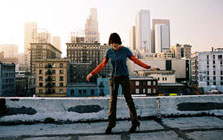|
|
|
|
Land
of Plenty
|
 |
|
Wim Wenders' films have always been elegant and often striking, but it is a long time since they had a sense of urgency. Post September 11 2001, Wenders has been repoliticised. His life-long love affair with American pop culture has at last transformed itself into a critical, outsider's perspective, fixed upon the question that many Americans helplessly ask today as they scan the globe: "Why do they hate us so?" Land of Plenty is a quickly made feature shot on digital video. It is, on many levels, a somewhat lumpy hybrid of two kinds of cinema to which Wenders has, down the years, been attracted. The most familiar part of the project concerns a broken family, and the tentative reunion of young Lana (Michelle Williams, strikingly good post Dawson's Creek), back from spending years in Palestine, and her tormented, all-American uncle, Paul (John Diehl). Paul is a figure straight out of the politically left, agit prop art of the 1960s and '70s – indeed, he resembles the sort of characters Nicholas Ray was creating near the end of his life, in the period when Wenders was trailing around and documenting his demise for Lightning Over Water (1980). A Vietnam veteran, Paul now fights the War Against Terror alone, from his surveillance truck. It is easy to laugh at Paul's excesses and delusions, but Wenders has a few shocks up his sleeve to ultimately humanise this character. The Christian themes that have informed Wenders' work since Faraway, So Close! (1993) have been a central reason for many viewers' disenchantment with it. A preachy, sentimental, We Are The World mood has smothered several of his recent films. Paradoxically, Land of Plenty ameliorates this situation by owning up to Wenders' religious interests and making them explicitly part of the movie, via the setting of a Bread of Life Mission, and by the comparison of differing religious beliefs. Particularly in its first half, the alternation between Paul's paranoiac rants and Michelle's grass-roots activism becomes tiresome, merely preaching to the converted and flattering enlightened spectators. And the didactic moment when the words "the truth some day" (borrowed from Leonard Cohen's song "Land of Plenty") appear written in the sky above the Twin Towers site may well be the worst spectacle Wenders has ever put on screen. However, in its best, road-movie section, the film has a refreshing energy and an admirably heartfelt political commitment. MORE Wenders: The Blues, The Brothers Skladanowsky, Buena Vista Social Club, The End of Violence, Hammett, The Million Dollar Hotel, Paris, Texas, Alice in the Cities, Wings of Desire, Until the End of the World © Adrian Martin August 2005 |
![]()